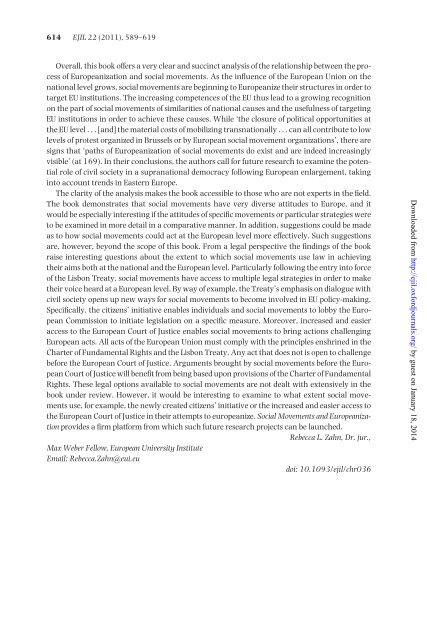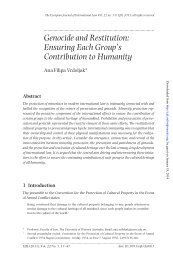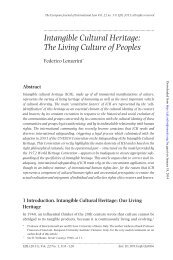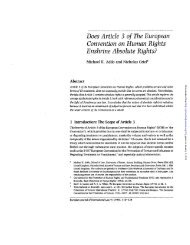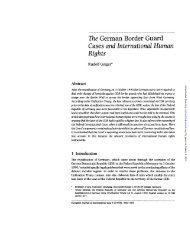Donatella della Porta and Manuela Caiani. Social Movements and ...
Donatella della Porta and Manuela Caiani. Social Movements and ...
Donatella della Porta and Manuela Caiani. Social Movements and ...
You also want an ePaper? Increase the reach of your titles
YUMPU automatically turns print PDFs into web optimized ePapers that Google loves.
614 EJIL 22 (2011), 589–619<br />
Overall, this book offers a very clear <strong>and</strong> succinct analysis of the relationship between the process<br />
of Europeanization <strong>and</strong> social movements. As the influence of the European Union on the<br />
national level grows, social movements are beginning to Europeanize their structures in order to<br />
target EU institutions. The increasing competences of the EU thus lead to a growing recognition<br />
on the part of social movements of similarities of national causes <strong>and</strong> the usefulness of targeting<br />
EU institutions in order to achieve these causes. While ‘the closure of political opportunities at<br />
the EU level . . . [<strong>and</strong>] the material costs of mobilizing transnationally . . . can all contribute to low<br />
levels of protest organized in Brussels or by European social movement organizations’, there are<br />
signs that ‘paths of Europeanization of social movements do exist <strong>and</strong> are indeed increasingly<br />
visible’ (at 169). In their conclusions, the authors call for future research to examine the potential<br />
role of civil society in a supranational democracy following European enlargement, taking<br />
into account trends in Eastern Europe.<br />
The clarity of the analysis makes the book accessible to those who are not experts in the field.<br />
The book demonstrates that social movements have very diverse attitudes to Europe, <strong>and</strong> it<br />
would be especially interesting if the attitudes of specific movements or particular strategies were<br />
to be examined in more detail in a comparative manner. In addition, suggestions could be made<br />
as to how social movements could act at the European level more effectively. Such suggestions<br />
are, however, beyond the scope of this book. From a legal perspective the findings of the book<br />
raise interesting questions about the extent to which social movements use law in achieving<br />
their aims both at the national <strong>and</strong> the European level. Particularly following the entry into force<br />
of the Lisbon Treaty, social movements have access to multiple legal strategies in order to make<br />
their voice heard at a European level. By way of example, the Treaty’s emphasis on dialogue with<br />
civil society opens up new ways for social movements to become involved in EU policy-making.<br />
Specifically, the citizens’ initiative enables individuals <strong>and</strong> social movements to lobby the European<br />
Commission to initiate legislation on a specific measure. Moreover, increased <strong>and</strong> easier<br />
access to the European Court of Justice enables social movements to bring actions challenging<br />
European acts. All acts of the European Union must comply with the principles enshrined in the<br />
Charter of Fundamental Rights <strong>and</strong> the Lisbon Treaty. Any act that does not is open to challenge<br />
before the European Court of Justice. Arguments brought by social movements before the European<br />
Court of Justice will benefit from being based upon provisions of the Charter of Fundamental<br />
Rights. These legal options available to social movements are not dealt with extensively in the<br />
book under review. However, it would be interesting to examine to what extent social movements<br />
use, for example, the newly created citizens’ initiative or the increased <strong>and</strong> easier access to<br />
the European Court of Justice in their attempts to europeanize. <strong>Social</strong> <strong>Movements</strong> <strong>and</strong> Europeanization<br />
provides a firm platform from which such future research projects can be launched.<br />
Rebecca L. Zahn, Dr. jur.,<br />
Max Weber Fellow, European University Institute<br />
Email: Rebecca.Zahn@eui.eu<br />
doi: 10.1093/ejil/chr036<br />
Downloaded from http://ejil.oxfordjournals.org/ by guest on January 18, 2014


